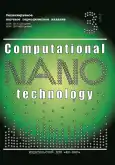Analysis of software code preprocessing methods to improve the effectiveness of using large language models in vulnerability detection tasks
- Autores: Charugin V.V.1, Charugin V.V.1, Stavtsev A.V.1, Chesalin A.N.1
-
Afiliações:
- MIREA – Russian Technological University
- Edição: Volume 12, Nº 3 (2025)
- Páginas: 67-79
- Seção: SYSTEM ANALYSIS, INFORMATION MANAGEMENT AND PROCESSING, STATISTICS
- URL: https://bakhtiniada.ru/2313-223X/article/view/350186
- DOI: https://doi.org/10.33693/2313-223X-2025-12-3-67-79
- EDN: https://elibrary.ru/BCEAHN
- ID: 350186
Citar
Resumo
As software systems grow in scale and complexity, the need for intelligent methods of vulnerability detection increases. One such method involves the use of large language models trained on source code, which are capable of analyzing and classifying vulnerable code segments at early stages of development. The effectiveness of these models depends on how the code is represented and how the input data is prepared. Preprocessing methods can significantly impact the accuracy and robustness of the model. The purpose of the study: to analyze the impact of various code preprocessing methods on the accuracy and robustness of large language models (CodeBERT, GraphCodeBERT, UniXcoder) in vulnerability detection tasks. The analysis is conducted using source code changes extracted from commits associated with vulnerabilities documented in the CVE database. The research methodology is an experimental analysis based on evaluation of the effectiveness and robustness of CodeBERT, GraphCodeBERT, and UniXcoder in the task of vulnerability classification. The models are assessed based on their performance using Accuracy and F1 score metrics. Research results: estimates of the effectiveness of different code preprocessing methods when applying large language models to vulnerability classification tasks.
Texto integral
##article.viewOnOriginalSite##Sobre autores
Valery Charugin
MIREA – Russian Technological University
Autor responsável pela correspondência
Email: charugin_v@mirea.ru
ORCID ID: 0009-0003-4950-7726
Código SPIN: 4080-4997
lecturer, Department of Computer and Information Security, Institute of Artificial Intelligence
Rússia, MoscowValentin Charugin
MIREA – Russian Technological University
Email: charugin@mirea.ru
ORCID ID: 0009-0001-1450-0714
Código SPIN: 7264-9403
lecturer, Department of Computer and Information Security, Institute of Artificial Intelligence
Rússia, MoscowAlexey Stavtsev
MIREA – Russian Technological University
Email: stavcev@mirea.ru
Código SPIN: 4948-2180
Cand. Sci. (Phys.-Math.), associate professor, Department of Computer and Information Security, Institute of Artificial Intelligence
Rússia, MoscowAlexander Chesalin
MIREA – Russian Technological University
Email: chesalin_an@mail.ru
ORCID ID: 0000-0002-1154-6151
Código SPIN: 4334-5520
Cand. Sci. (Eng.), Associate Professor, Head, Department of Computer and Information Security, Institute of Artificial Intelligence
Rússia, MoscowBibliografia
- Charugin V.V., Chesalin A.N. Analysis and formation of network traffic datasets for computer attack detection. International Journal of Open Information Technologies. 2023. Vol. 11. No. 6. (In Rus.)
- Busko N.A., Fedorchenko E.V., Kotenko I.V. Automatic evaluation of exploits based on deep learning methods. Ontology of designing. 2024. (In Rus.)
- Li Y., Li X., Wu H. et al. Everything you wanted to know about LLM-based vulnerability detection but were afraid to ask. 2025. doi: 10.48550/arXiv.2504.13474.
- Liu C., Chen X., Li X. et al Making vulnerability prediction more practical: prediction, categorization, and localization. Information and Software Technology. 2024. Vol. 171.
- Drozdov V.A., Yakovlev O.V. Application of large language models for vulnerability analysis. Scientific aspect, № 6-2024 – Inform. Technologies. 2024. (In Rus.)
- Charugin V.V., Charugin V.V., Chesalin A.N., Ushkova N.N. Constructor of natural language processing blocks and its application to log structuring in information security. International Journal of Open Information Technologies. 2024. Vol. 12. No. 9. (In Rus.)
- Ridoy S.Z., Shaon M.S.H., Cuzzocrea A. et al. EnStack: An ensemble stacking framework of large language models for enhanced vulnerability detection in source code. 2024. doi: 10.48550/arXiv.2411.1656.
- Sultan M.F., Karim T., Shaon M.S.H. et al. A combined feature embedding tools for multi-class software defect and identification. 2024. doi: 10.48550/arXiv.2411.17621.
- Feng Z., Guo D., Tang D. et al CodeBERT: A pre-trained model for programming and natural languages. 2020. doi: 10.48550/arXiv.2002.08155.
- Guo D., Ren S., Lu S. et al. GraphCodeBERT: Pre-training code representations with data flow. 2020. doi: 10.48550/arXiv.2009.08366.
- Guo D., Lu S., Duan N. et al. UniXcoder: Unified cross-modal pre-training for code representation. 2022. doi: 10.48550/arXiv.2203.03850.
- Karthik K., Moharir M., Jeevan S. et al. Temporal analysis and Common Weakness Enumeration (CWE) code prediction for software vulnerabilities using machine learning. In: 8th International Conference on Computational System and Information Technology for Sustainable Solutions. 2024.
- Li Z., Zou D., Xu S. et al. VulDeePecker: A deep learning-based system for vulnerability detection. 2018. doi: 10.48550/arXiv.1801.01681.
- Zheng T., Liu H., Xu H. et al. Few-VulD: A few-shot learning framework for software vulnerability detection. Computers & Security. 2024. Vol. 144.
- Bhandari G.P., Naseer A., Moonen L. CVEfixes: Automated collection of vulnerabilities and their fixes from open-source software. 2021. doi: 10.48550/arXiv.2107.08760.
- Pereira D.G., Afonso A., Medeiros F.M. Overview of friedman’s test and post-hoc analysis. Communication in Statistics – Simulation and Computation. 2015. Vol. 44.
- Pohlert T. PMCMR: Calculate pairwise multiple comparisons of mean rank sums. 2016. doi: 10.32614/CRAN.package.PMCMR.
Arquivos suplementares












